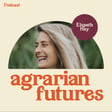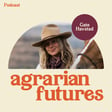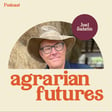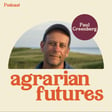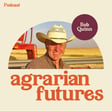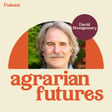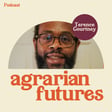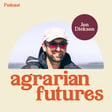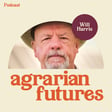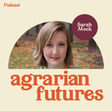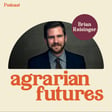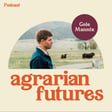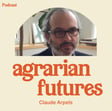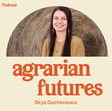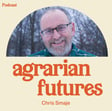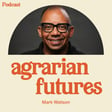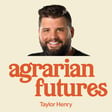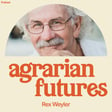Introduction to Agrarian Futures
00:00:00
Speaker
It's so important to think about what are our farms generating besides this one product that we're growing or something like is it to our values? Is it actually creating the kind of environment and world that we want to live in?
00:00:16
Speaker
In season two of Agrarian Futures, we're starting with a simple question. How did we get here? Farms are disappearing. Land is getting harder to access. Rural economies are hollowing out.
00:00:28
Speaker
But there are people building better ways forward.
History of American Farming
00:00:31
Speaker
Join us as we investigate what's broken in our food system and what it looks like to build something better.
00:00:41
Speaker
Well, Beth, thank you so much for joining us on Agrarian Futures. It's a real pleasure to have you here with us and to jump off a conversation to help us understand along the lines of this theme that we've had this season in our podcast is how did we get to where we are in American farming today? It's such a huge question that we could spend years and years worth of podcasts trying to uncover it. But what I want to do here is I want to just take a little bit of a bite of that much larger question.
00:01:12
Speaker
And your book, Bet the Farm, was a fantastic resource for me to understand pretty significant chunks of ah why we are where we are today in American agriculture.
00:01:24
Speaker
It's rare that I come across a book that is written in such a way that is so understandable to a common audience, to a lay audience that isn't familiar with farming, and yet is one that has very profound insights into the fundamental realities of why farming is the way it is.
00:01:41
Speaker
So that's why I was very excited to have you on to the podcast and be able to like extend that conversation with you. Let's start off with this. Can you help me understand and help our listeners understand why in America we don't have the kind of food culture that exists in Europe?
00:01:59
Speaker
like We don't have famous cheeses from one certain area. We don't have dishes that go back to one particular region that are so unique.
00:02:10
Speaker
And we have a very homogenized food culture in our country. Let's start off with that. Yeah. Well, thanks so much for having me on the show. And your comments about the book are exactly the kinds of comments I'd love to hear. I'd love to hear about the book is that, you know, it's it's accessible and yet dives deeply. And the book really and did come from this whole question of like, how did we get here?
00:02:37
Speaker
We'll talk a lot about that. But to answer your question, so... You know, and there's always exceptions to the rule. So I'm sure somebody's listening and like, well, we have a great cheese here in Oregon, you know, so. Wisconsin.
00:02:49
Speaker
Or Wisconsin. ah You know, there's not to say that but it doesn't exist. So let's just be clear. But really, if you think about the history of our nation, We were formed from basically corporate interests to provide empires.
00:03:07
Speaker
That was our intended reason that people came here. So Jamestown, our first colony here in this country, was funded by a company and they came here to develop some kind of commodity to sell in Europe.
00:03:24
Speaker
It ended up being tobacco, so it wasn't a food product. But from that inception, from our inception, that was in our DNA.
Impact of Railroads and Export Focus
00:03:33
Speaker
You know, you think about the Boston Tea Party, these iconic moments in our history, basically that, you know, we were developed here as an English colony to supply the empire.
00:03:45
Speaker
And then as things kind of moved westward, westward expansion happened along rail lines for the most part, you find a lot of really interesting advertisements.
00:03:58
Speaker
Well, let me just make clear that the land around the rail lines was given to the rail lines and was actually marketed by them to individuals for people to do farming along the rail lines so that the whole idea of it was to ship commodities to cities and then usually often to, a for export to Europe.
00:04:25
Speaker
So this meant that even from the beginning, and one of the books that I love to talk about, I talked about in the book a lot, is called Prairie Fires. And it's a book that's about Laura Ingalls Wilder and her actual life, which was in c incredibly difficult. There was nothing like cute and sweet and what the TV show kind of made it be like. I mean, I'm sure she had some great family moments,
00:04:52
Speaker
But they struggled incredibly because her father was always chasing this kind of American agrarian dream across the Midwest and most largely to grow something that was going to make him a lot of money. And they had every kind of problem, you know, prairie fires and they had massive locusts, locuts locusts like crazy locust stories that just...
00:05:18
Speaker
that It just makes me so afraid. Like, when's that going to happen again? You know? Yeah. who So we didn't develop this kind of culture that a lot of European towns have where you're known for some kind of ham or some kind of cheese. And they really, this artisanal style of food happened there and not as much here as a result. Yeah.
00:05:42
Speaker
And then you see that now a lot of towns are known for something that's kind of an ultra processed food, right? where' We're known in Iowa for like pork tenderloins, which largely come from a Cisco truck that pulls up and you unload everything into the freezer and then it goes into the deep fryer and onto a plate.
00:06:03
Speaker
And that's our regional food. And maybe somebody, you know, pounds out the pork tenderloin. I'm sure that there's some great pork tenderloins out there. But for the most part, every restaurant in Iowa is like that.
00:06:17
Speaker
And it's just has a lot of fried food that was frozen, which is probably the most difficult part of having moved to Iowa from California.
00:06:28
Speaker
From San Francisco, right? Yes, exactly. Yeah. Yeah. So it seems that while in in Europe, there was a centuries, millennia long evolution of these small towns, small towns and small cities, where in particular in the context where transportation is very limited. and So all of your production has to be local.
00:06:50
Speaker
You don't have a train. You don't have... probably even a really good road system. Outside of once once Rome fell and those days were over, you don't really have a great long distance road system. So all of your agriculture has to be very, very local. And so for centuries, that was the name of the game. that Those were the rules of doing farming is you produced what you could use in your own community.
00:07:12
Speaker
And then probably those, whether it's black forest ham or it's a special cheese, it had to be something that was high value enough, distinct enough that you could then go to the the very significant expense of transporting it to another city.
00:07:27
Speaker
Maybe you're going from a ah region around in France to Paris or something like that. These aren't commodities. We can't ship grain at this time. We can't ship anything that's bulky and most everything has to be local by necessity.
00:07:41
Speaker
And then when you come over into North America, all of those rules go out the window, especially with the advent of the train and then quickly the highway system and refrigeration, all of those things that happen in pretty amazingly short span of time, given the millennia-long evolution that it took over in Europe.
00:08:00
Speaker
Yeah, it was all just fascinating to me, having never really considered all of those how those factors that go into it. And you're right, like we we were started as a colony to export things. And it seems that when pioneers started out in new areas, they were producing also for export, right? Not export to...
00:08:23
Speaker
to faraway countries necessarily, but they were producing them for export into cities and into those commodity markets. Can you talk a little bit about that? Like that we've always had commodities based agricultural system in our country.
00:08:37
Speaker
You had things like wheat that was then starting to be grown in some volume and that's what people were and coming out west to along the rail lines, particularly in the Midwest to grow. They were growing wheat in large part.
00:08:52
Speaker
My husband's great, great grandfather that initially came out here to Iowa was growing corn. And I think it's it's an interesting thing because a lot of us think about this kind of time before, like, well, before World War II, let's say when there were a lot of chemicals around, that's often cited as kind of when things really changed, World War two We kind of think about like, oh, there was this time before where everybody was growing fruits and vegetables and had diversified farms.
00:09:25
Speaker
And whereas that is true, because you didn't have the actual mechanization and the chemicals and the pesticides to grow 10,000 acres of something or even probably 1,000 acres of something.
00:09:40
Speaker
But still within that scale of having 150 acres 300 acres, whatever it was, 10 acres, you were growing some kind of commodity that you were then going to
Mechanization and Chemical Use Post-WWII
00:09:52
Speaker
And you grew fruits and vegetables for your own family to can. It wasn't like there was like a large fruits and vegetables markets and people were going to farmers markets or something or like shipping them to cities.
00:10:06
Speaker
Also, if you think about that system where for a very long time, as documented in the book, The Jungle, We were shipping in cattle and hogs into cities. So that was also a commodity system where, again, John's father and grandfather would raise hogs and then you'd get a train car full and you would then get them to you know, the town and then ship them to Chicago.
00:10:35
Speaker
Then they'd be slaughtered in the cities. We've moved that now out into rural communities. People don't want slaughtering in the cities and it made quite a mess. But then after the processing, it's shipped out again.
00:10:48
Speaker
So still we have hog facilities everywhere in Iowa. and We have something like 23 million hogs at any given time in this state. A lot of it is owned by companies like Smithfield that then are international companies that ship it out around the world, around the country also.
00:11:10
Speaker
We were built that way. There's also some really fabulous books. There's a book about the sugar trade and the fact that England had the whole concept of tea time,
00:11:21
Speaker
came from the fact that they had these colonies that grew tea and grew sugar. And so they needed to sell it. And so they started this actual cultural tradition now of tea time, where people come together and drink tea and use sugar.
00:11:38
Speaker
But that came out of the empire selling to the people. Are you saying that it was somewhat like a corporate push? There was ah an active marketing push to develop Tea Time to sell their tea and sugar.
00:11:53
Speaker
Yes. And I mean, we forget that that's the basic concept of empires is the financial aspect of it. Yes, like countries got excited about taking over the world or whatever, and European countries battled it out and I want this area and
Economic Challenges in Farming
00:12:11
Speaker
I want that area.
00:12:12
Speaker
It was actually though there was money involved in all of that and there was commodities and what you were the really the only thing. You didn't have manufacturing back then. You had agriculture.
00:12:26
Speaker
And companies saw a brand new opportunity with something that they could not produce there in Great Britain. You had tea, you had the sugar, you had things that could be desirable back home and they could make a lot of money on it if they were the first ones to go out and develop it.
00:12:41
Speaker
Yeah. I mean, I'm not a historian. I'm not going to say that I'm like an expert of European history. So I'm sure there's people you could have on your show that know a lot more about it than I do. But yeah, the government and the corporate entities were working completely.
00:12:56
Speaker
It was completely entwined. That makes perfect sense. So you spoke earlier about and maybe an inflection point at World War II. Maybe we'll talk about it in that sense rather than a complete different reality before and after.
00:13:10
Speaker
It really was just maybe an amping up of something that was already the case. And I remember my grandfather speaking about how they had however many acres of corn. It wasn't that much, but that was to sell.
00:13:22
Speaker
And then they had a couple of hogs. They had a couple of sheep. They had probably a dairy cow and some chickens, and they had a big garden. So all that was for home consumption and then the corn was for sales. But then you have World War II and you have increased chemicalization, you increased mechanization.
00:13:39
Speaker
And one of the things that you shared in your book, I think, summed up so much of what's happened in agriculture in the United States. So you mentioned that it used to take 28 hours to work an acre of corn. 28 person hours And now it takes just two hours to work that same acre of corn.
00:14:00
Speaker
So what did that transition mean for the number of farmers then on the land and then the social fabric of rural America? You're asking some really great, heady questions.
00:14:13
Speaker
I love that One of the things that I guess is important also to note is that agriculture has never been exceptionally profitable.
00:14:26
Speaker
So it's always been something where, you know, like now, farmers are land rich, cash poor. know, like you didn't make a ton off of it. And I think in the pioneering days, because you didn't have a lot of other options, like I was saying, you didn't have a lot of manufacturing. We didn't have an ah industrialized but revolution at that point. Like it it came, you know, it came not that long after, but you you didn't have tons of opportunity. And if you had land,
00:14:57
Speaker
that was what you were going to do with it was try and make money off of it. What happened in this time period where you ended up having machines and pesticides, and let's be clear, like pesticides are used because they are labor saving. They are time saving. It's not just that everybody loves chemicals and loves spraying them.
00:15:19
Speaker
People do that because they're not going to go out and weed and ho You can't do that anymore for thousands of acres. What it did, interestingly, is is that when you were able to work this ground in a much faster fashion, it meant that people could go to work in town, right? So you could then handle another job, which it's interesting to me so still that how many people around here say, oh, well, my father had a hobby farm and he really was working at John Deere. And well, that's like 90% of all farms have that off farm income.
00:16:04
Speaker
It basically, it freed up people to do that and to go have another job. And so people could afford to farm in a sense, and you could afford to start putting more money into the farm and buying bigger machinery and increasing your land because it's a bigger volume game now.
00:16:26
Speaker
You've got to make money if you're just going to make $2 per bushel, which is probably a good amount per bushel to make on your corn, Well, you better have a lot of bushels, right? so same thing if you're just a food farmer, small scale food farmer, and you've got kale that you're selling for 50 cents more than it costs you to actually grow, you kind of have to have a lot of kale.
00:16:53
Speaker
So that's basically what the result of that big shift was. I think it's worth going back to what you were sharing there about people not enjoying putting out pesticides. It's not that this is something that a lot of farmers are really excited about, but it's a tremendous time saver.
00:17:12
Speaker
So I have pictures of my dad ah when he was young, when he was a teenager going out and he's standing there with his siblings with a hoe in his hand. And they talked about chopping. i think they were chopping beans. and So they were chopping all the weeds in between the soybeans and they would spend hours and hours and hours. And I think it built character for him. And that's that's a great thing.
00:17:30
Speaker
I didn't get that character building, which I don't really mind. I get character building a different way. by chopping beans and picking rocks and all of those things that that young people, if you have a large family, you can send out a lot of very cheap labor to do
Transition to Organic Farming
00:17:45
Speaker
And you have this great anecdote in your book, something along the lines of you sharing that you wanted to go organic and some farmers, old time farmers, they weren't so excited about that.
00:17:57
Speaker
Can you share about that story It was kind of early on. So a lot of the book is about us moving from the Bay Area, San Francisco Bay Area, to Iowa to take over my husband's family's land.
00:18:10
Speaker
And in that process, we had to deal with the fact that there was already farmer that was on the land. His dad was still here. He was in his early 70s at that point. And we started talking about coming back and he was just very resistant.
00:18:27
Speaker
Part of it was, is that John had worked on the farm for a lot of his time while he was in high school and as a kid. He really loved it. He really wanted to come back and take over the farm. And like a good 1980s farm dad, his dad said, absolutely not. There's no money in farming.
00:18:46
Speaker
We'll be lucky if we get out of this farm crisis with the farm. You need to leave and go do something else. So he left and he ended up going to culinary school and he's ah a trained chef and a butcher and Anyway, so we decided to come back. I had been reporting on food and agriculture for like 20 years by that time too. So I thought I knew a lot, you know, I'd been on a lot of farms and I had seen a lot of different kinds of sustainable farming things. And, you know, so we had kind of thought, well,
00:19:20
Speaker
we don't want to grow corn and beans. Maybe we'll grow row crops, but they'll be organic. Maybe we'll do food grade black beans or we we didn't know what we were going to do at that point, but we knew we didn't want to spray chemicals. And I was sitting interviewing John's dad for, I did a lot of interviewing of him even before we decided to move back because I was getting family history and that kind of thing. And So I was asking him lots of questions and then he turned around and he started asking me questions and he said, well, what what is it that you actually want to do here on this farm?
00:19:56
Speaker
And I, okay, let's also make it clear that I was a city kid through and through, right? I grew, I was born in Queens. I lived in New Jersey and suburbia growing up. I lived, all you know, always in kind of sub suburbia or cities.
00:20:11
Speaker
And so he said, well, what is it that you want to do? And I said, well, we're thinking about organics and food for people. And and he was just like, organics?
00:20:22
Speaker
And he went out in the back porch and he came back, you know, this older man, you know, shuffling around, came back with this, this hoe that had been hoed down to like an inch of its life. Right. Literally there was like an inch left on the hoe. Right.
00:20:40
Speaker
I don't know where that hoe is actually anymore. I should find it. But he he held up this hoe and started shaking it at me. And it was like, organics, this is what organics means.
00:20:51
Speaker
It means working your body to death. You know, it means like getting out there every day And hoeing and weeding. And is that actually what you want to do with your life?
00:21:03
Speaker
I was a little bit aghast, you know, because we we think about organics and all of these things from the outside as being, you know, very romantic. And I i speak about this in the book a lot. It's just...
00:21:15
Speaker
We have this perception that we've romanticized agriculture, especially at the smaller scale, and we can get our hands in the dirt, we can raise clean food, but we forget about and the extreme amounts of labor that are involved.
00:21:32
Speaker
And it's really extreme.
Accessing Land for Farming
00:21:35
Speaker
In many cases, to do it requires very cheap labor, which most people don't really want to sign up for. yeah I mean, we'll get to it later, but I do a podcast as well. I just did one about immigrants in the food system specifically.
00:21:49
Speaker
i watched a Wall Street Journal video doing research for it, and there's someone from the Heritage Foundation, and she's like, that's just insulting to say that people don't want to do this work.
00:22:03
Speaker
Okay, but that's it is kind of the reality. But even more than that, when I spoke to this st demographer, Valerie LeCart, she was talking about the fact that you know in our rural towns in particular, where a lot of manufacturing is and obviously farming, we've lost population. like We just simply don't have people anymore. And then you add to that...
00:22:27
Speaker
people who have aged out of the work. And so that makes up a lot of rural towns too. And so who do you think is actually doing the work who is there?
00:22:39
Speaker
We've historically, again, in our DNA, we are all immigrants. If you are you know not native, you are an immigrant. And so your family often came over to do manufacturing, to do farming,
00:22:55
Speaker
to do the work. And that is what we have still as our system. You mentioned the land access challenge. ah Something that I've been thinking about quite a bit lately is how folks can get onto the land in a way that is is doable as you're able to cash flow it. One of the resources that i came across recently was the book, think Land, Livestock and Life by Alan Nation.
00:23:19
Speaker
And in there, he shares how in many countries throughout the world, like New Zealand, maybe Argentina, the cost of land is very tightly tied to the productivity of that land.
00:23:33
Speaker
And that is just not the case here in the United States. And that makes land access so challenging for someone who doesn't inherit land or doesn't inherit a whole lot of money because you simply cannot buy a farm and cash flow it.
00:23:50
Speaker
with the income from that farm. And that's one thing, like, especially if you're doing commodity crops, like forget it. It's just way too money intensive. And there's too little margins, even on the cattle side of things, livestock side of things, also very money intensive, land intensive.
00:24:07
Speaker
Other than veggies, it's really, really hard to do that. But the lease rates for land still tend to be in alignment with the productivity of that land.
00:24:18
Speaker
So it seems that if I was a young person or wanting to get into farming, that I would have to say, there is no way that I can buy my way into enough land or the right kind of land and be able to cash flow that through farming.
00:24:31
Speaker
And it really like leasing seems to be the way that I can afford to get into farming. Does that seem about right and line up with the research that you've done into this?
00:24:42
Speaker
I definitely think so. I mean, I think it's like if you wanted to start any kind of business, is it really feasible for you to go in and buy the building and, you know, set up the whole kitchen? or I mean, it's a lot of investment before you have some proof of concept that it's actually a good idea or that you know what you're doing, right? So it it doesn't make sense that people think, oh, we should just all have access to land. I think I don't know how that would work.
00:25:12
Speaker
It's a great theory. And I think you're exactly right. Like, let's say even a moderately priced piece of land in Iowa that has a good corn suitability rating, let's say it would cost you now $12,000 an acre or or something like that, right?
00:25:28
Speaker
If we get 200 bushels per acre, let's $5, you're making like $2 bushel, you've made $400. $400 on kind large investment. you've made four hundred dollars four hundred dollars on that kind of a large investment Yes, the investment is in the land, period.
00:25:44
Speaker
When we get to hard economic times, people always start investing in land because land retains or it will bounce back even if it loses some of its it's value.
00:25:56
Speaker
So it's like an asset class that is very reliable. And the more that people don't have enough to eat or we have changing climate,
00:26:07
Speaker
the more valuable the land is going to get. And that's a bet that investors take. So to be clear, though, you could have an acre and grow vegetables. And there's people who claim that you can make a profit off that.
00:26:21
Speaker
I don't really know. There's, again, great books. There was someone at the Practical Farmers of Iowa conference this last year. did a whole presentation about that. If you have cattle or goats, you can purchase really marginal land and graze really well, especially goats.
00:26:41
Speaker
The cycle would be shorter. You don't have to have a ton of hay for them in the winter, particularly if you don't have harsh winters. you could You could probably make that pencil out where you at least probably wouldn't lose lot of money, let's say.
00:26:56
Speaker
But yes, I think that leasing is an option.
Collaborative and Inclusive Farming
00:27:00
Speaker
I also do think that those of us who are involved in different types of agriculture, ah regenerative, organic,
00:27:10
Speaker
We need to formulate better systems of land transfer because our kids, for example, want ah a few of them don't, you know, the next generation of Hoagland's that would get this land.
00:27:23
Speaker
One of them out of the four has kind of some more specific interest in actual farming, but not Not super duper. He's, you know, he's a little on the fence about it.
00:27:35
Speaker
So ah we do now work with, you know, it's, it was part of the book. There's a whole chapter on the concept that we started thinking about. We called co-farming. was kind of after co-housing idea.
00:27:48
Speaker
It's like we have 570 acres. It's sizable. And we rotate cattle all the time and the goats. Yeah. It means that we have a lot of capability to have other operations on the farm with us. At the same time, we could easily integrate chickens. We could easily integrate honey and bees.
00:28:09
Speaker
Why does everybody have to have their own little patch of land doing it? And or the kind of joel Salatin model that I see people are really enamored with where you have, and he's ah he's a farmer. If people don't know, he's a kind of famous farmer.
00:28:25
Speaker
Where he does everything. He's the guru of grazing. The guru of like, do everything at once and it'll then it'll work out. And you see this in the biggest little farm, you know, like, oh, if we just have the the ducks to take care of the snails to take care, you know, P.S. Like you will burn out five years doing that.
00:28:47
Speaker
If you try to do it all yourself. Right. You cannot do it all yourself and you cannot do it all yourself as somebody who doesn't know what they're doing and getting into farming for the first time. You'll run yourself ragged. So we can all work together on the same property. And the problem really for us has been housing, right? There's not a lot of housing around.
00:29:08
Speaker
and We do now work with a young farmer who moved out from Colorado into a neighboring
Economics of Large-Scale Animal Farming
00:29:13
Speaker
town. He wants to farm. He wants to be, he wants to do small grains mainly, but he loves, you know, working with John. And there so now the two of them do all of the livestock kind of work together. He does a lot of it so that John can do things like sending invoices to people and, you know, the actual work of farming, which is business also.
00:29:36
Speaker
And then Jake also, we rotate him in to do small grains and he's starting to learn about, you know, we did wheat last year. It didn't work out great, but now we're doing Milo and...
00:29:49
Speaker
We also have a group of African refugee farmers that are growing vegetables. And so they're trying to grow at some scale. They were involved in a program in Des Moines called Global Greens, where they taught business of growing vegetables. and But the plots are really small.
00:30:07
Speaker
So now they came out here. They've leased the land. They want to do it they want to do it all super proper and like pay for the land, what everybody else is going to pay and So they're paying like $200 an acre and it it's land that is not a high corn suitability rating or we wouldn't be doing that anyway.
00:30:27
Speaker
and with 570 acres, is two acres a big deal? no right? So they can be here. They can get started.
00:30:39
Speaker
We can expand the area next year if they they're building relationships with supermarkets. That's great. Yeah. so that to me is a better solution. And I hear people all the time who are like, oh, we just, you know, I i need somebody to take over our land or i inherited this land and I don't really know what to do with it.
00:31:05
Speaker
There's all sorts of that kind of situation going on that we could tap into. So you mentioned raising chickens. And here's something, this is a little bit of a divergence from what we were just talking about.
00:31:16
Speaker
But this really helped me understand the whole business of poultry farming, hog farming, that's that's really bewildered me for a long time. Because um i i live next to buildings like this, and I can smell them.
00:31:31
Speaker
And I can't imagine how or why someone would want to go and put one of these systems up. So we're talking like a chicken barn or chicken facility or a hog facility. And these are huge, monstrous buildings, super long, very expensive to put in.
00:31:47
Speaker
Half a million dollars or more, I'm sure. And farmers don't make a lot of money off of these. And it's a very, very significant amount of money to put in for a job that doesn't make a lot of money.
00:32:00
Speaker
And it's not adding at all to the aesthetics of your farm. It's not... fun work. So I never quite could understand why someone would do that. But you you helped me understand the but the internal logic of wanting to have a facility like this on the farm despite the downsides. Can you can you help folks understand why a farmer would want to make that kind of investment in a hog or poultry facility?
00:32:25
Speaker
Yeah, it's it's kind of, it is a fascinating thing. I talked to a banker about it. She was very involved in helping people put them up. And she explained it this way is just that there's only there's two reasons why you would have a hog facility.
00:32:41
Speaker
One is that you have the land to put out the manure. So that's like key number one, because otherwise to get rid of all of that beep, beep, beep, To get rid of it otherwise is a very, very expensive thing to try and do.
00:32:57
Speaker
So you have to have the land that you can put it out on as manure, as fertilizer. And if you have the land, then it becomes, in essence, free fertilizer. Exactly. Then you are generating your own fertilizer as well.
00:33:11
Speaker
But the second reason is usually because you're looking to have a business for and the next generation to come back. So unlike what we are speaking of previously, where in a diversified farm, you could just kind of add another thing to the diversification, you don't have that ability when your land is in corn, fence row to fence row, right? There's like literally no space to do anything else.
00:33:43
Speaker
And your daughter wants to come back to the farm. Well, a hog facility, a chicken facility is one way to do it because you need maybe an acre,
00:33:54
Speaker
And you can put it up. The way that it works usually is is that the farm pays for the building. They take out a loan. It can be worth, yeah, half million to a million dollars to put it up. So 30-year loan for that or whatever.
00:34:11
Speaker
The farm then has to maintain the building too, which is kind of key because otherwise... you lose out on the real moneymaker, which is after that 30 years has passed. Once you've paid off the building, then you can start making some money on it, but only if you've upkept it and it's in good repair and it can still be used.
00:34:35
Speaker
So what happens is is that you've usually contracted with a company already. So here, like Iowa Select Farms, they own basically all the pigs and and lots of big millions and millions of pigs in the state. So the company comes in and they rent your hog space is what it's called. And they pay you per hog space.
00:35:00
Speaker
So you kind of are guaranteed the amount. They tell you what how the hogs are going to be fed, the whole system of like how it's going to go. Maybe sometimes they you know you for poultry, you have poults in one area, they they deliver them. And then maybe as the animal gets older, they move or something like that.
00:35:20
Speaker
But they they do all of that kind of protocol and what it's fed and the shots the animals are given and all all of that is dictated. And then the animals, you take care of them. You basically are the caregiver, carekeeper, pig keeper.
00:35:36
Speaker
And then they're at wait and the company comes and picks them up. So it's kind of like, I was going to say like renting an apartment, but then you don't tell people what they have to eat in the apartment.
00:35:48
Speaker
ah So it's not like anything, but it is kind of a fascinating thing because, You know, we've had this whole concept of farmers in this country. like, oh, they're so independent.
00:36:04
Speaker
They're so like strong willed and they're going to do it on their own. And they're, you know, gritty and all of this. And we've had this kind of freedom to farm concept where you're supposed to be able to do what you want on your land. But the reality is, is that, you they don't make any choices anymore. you've You've stolen away all of the creativity for farmers, all of the ability to kind of problem solve, to make choices.
00:36:33
Speaker
So even if it's like you have two crops, you have corn and beans that you're growing, That's all you got is corn and beans. And so if you, in any given year, you think, okay, I'm looking at the markets. I'm looking at the fact that, you know, this year it's crazy. I mean, all of the commodity programs have been cut where we don't have any USAID. We don't have any school lunch. Like where are the commodities going to go?
00:37:00
Speaker
don't know. But but you don't really have the ability to choose growing something else because this is the system. And now you own the combine that does this thing. You're locked in yeah You're locked in.
00:37:14
Speaker
So there is no real independence. And I think that... The more that we think about farming, there's opportunities. and And when we diversify, we're giving farmers opportunities and having them choose what's best for them, what's best for the market this year um instead of just being locked in.
Innovation and Cultural Change in Farming
00:37:37
Speaker
That is great insight. So to recap, if you have a monocultured field, and you're a farming fence row to fence row, there is no place for another income opportunity. Whereas on your farm, you could plant an orchard of fruit trees. You could have bees that are able to collect pollen and and nectar from all of these flowering things that are all across your farm.
00:37:59
Speaker
There's a whole list of additional enterprises that you could do on your farm that would help you diversify and bring new generations on. But because there's so few on a commodity operation, that's where if you want to earn, if you want to diversify your income, there's just not that many options.
00:38:18
Speaker
So even if this option is not great, you're already locked into the system. and And this is one of the very few opportunities that you have to increase your income, diversify your income on the farm. If we're not talking about going off the farm and earning income there, which is what most farmers end up doing to some degree or another.
00:38:38
Speaker
Yeah. I mean, I think there probably are opportunities, but nobody talks about them like on a commodity farm. Like, you know, we have this concept of conservation land where people have to be paid for their, if they're not going to farm it, we've got to pay for them to not farm it in this country. Well, what if you took that marginal land, which is what people should have in conservation and CRP,
00:39:05
Speaker
What if you, you know, yeah, had goats. What if you didn't cut down all of the trees in order to farm this this little sliver of more land? That's what everybody around here does.
00:39:18
Speaker
You know, you have this tiny little more section you could get out of a field by cutting down all of the trees on the creek side, let's say. You know, why don't you graze it? and Why don't you put in fruit trees? I mean,
00:39:30
Speaker
It doesn't make sense. And I don't think there's any kind of knowledge sharing in that way. There's just, we've lost all of that kind of ah ability to get people information about what you could do on land instead of, and now that we've gutted the USDA, which was the logical place to have that kind of information sharing, i have no idea where it come from.
00:39:59
Speaker
But if you were to propose that to many of your farming neighbors, they'd probably hop down or slowly walk down onto the combine or the tractor and say, you want me to move goats in my stream area? You want me to plant a fruit tree? Where am I goingnna where am i going to sell that, right?
00:40:15
Speaker
Right. I'd have to work. I'd actually have to work. I don't mean to be like cavalier about it. Like, sure It's a kind of work to sit in an air conditioned combine and drive around.
00:40:28
Speaker
But we're talking about, yes, like people would have to probably do more physical work and which, yes, they don't want to do. There's no guaranteed outlet for it. Corn and soybeans, you don't have to think about where it's going to go.
00:40:40
Speaker
I mean, you have to follow market markets and those kind of things, but you know there's going to be a buyer. there's That's never in question. Goats and apples. That's exactly right. Yep. So even if we have all of these diversification, right, on our farm, okay, then what, right?
00:40:56
Speaker
Where are those chickens going? How are you selling those chickens? So again, there's a lot of reasons why people don't do this other kind of farming. Again, like one of the main reasons why I wrote the book is is that it's very nice and sweet to talk about sustainable farming and this farm does this and this farm does that.
Business Aspects of Sustainable Farming
00:41:18
Speaker
But at the end of the day, if we don't realize, if we don't really understand how we got here, to come back to your podcast series, if we don't understand how we got here and why we are in this situation,
00:41:30
Speaker
I don't feel like we can ever make real change about it because it's it's embedded in the culture. And if you want to change culture, you got to have some real you know outline and figure out what what the vision is and where we're heading.
00:41:47
Speaker
I think that was the real strength of of your book. As I read it, time after time popped certain myths or bubbles of beliefs that people have that I've had about farming.
00:42:00
Speaker
ah that farming should look a certain way, that of farms should be more profitable. And your book helped me understand time after time why why farming doesn't look the way that we want it to farm or that lines up with the mythology that we have around farming.
00:42:18
Speaker
And I think the tremendous service that that offers is then helping people who want this to change, ah who want to do it themselves, or they want to make a change in the food system to really have a sober minded understanding of what the reality is, what the real dynamics are.
00:42:38
Speaker
And then from that point to be able to make thoughtful strategic decisions, right? ah If you understand that you can't cash flow based on buying land in most cases, then you have to think about maybe I'm going for very, very marginal land and I'm going to go about farming goats.
00:42:55
Speaker
Or I want to go about leasing land, recognizing the downsides that go along with that. If I'm a farmer, after I read this, i I probably feel less guilty or bad about myself and my abilities to make money when I recognize that Almost no one else is making money at this.
00:43:13
Speaker
And the way that things are set up, it it seems to me that this is the best way to do it for many folks would be, you recognize that you're not going to make money and lean into it as as a lifestyle thing?
00:43:25
Speaker
Go and make your money off a farm. like That's where the money is. Probably easier to make is make your cash off farm and lean into like, let's make this a really, really high quality lifestyle thing. So maybe we get off the tractor and we graze animals and we plant trees and have it be a place full of wildlife, a place that is aesthetically pleasing and place that people want to be rather than thinking I need to be able to make money off of this. Because in reality, most people don't.
00:43:54
Speaker
Yeah, I think initially that that's definitely true. I do think, yes, I've heard heard from a lot of farmers who have read the book who are just like, wow, thank you for like letting people know what our actual story is.
00:44:10
Speaker
You you know shine a light on this thing that nobody talks about. And yes, feel like not guilty. Like, wait, why why am I the one who can't make this pencil out? Right.
00:44:21
Speaker
But at the same time, I guess I also really wanted people to understand that it is a business. Like if you want to do a kind of lifestyle and homestead and that's awesome, but that's not a business.
00:44:36
Speaker
And that farming, ah particularly in... you know, non-commodity ways and in sustainable ways, let's say, regeneratively, it means that you have to spend as much time sitting at a desk, contacting customers, putting up your website, sending email, you know, having Instagram followers, that is farming as well for
Empathy and Historical Choices of Farmers
00:45:02
Speaker
you. Because it's every part of the system. oh and like, but let's add calling the meat processor and setting updates and then figuring out the delivery system or how do I go to the farmer's market?
00:45:14
Speaker
There's so many logistics that are involved in it. I just really wanted people to understand, not to think like, oh that's so that's too overwhelming. You know, I can't do that.
00:45:26
Speaker
But yes, like take it slow, have one product, figure out what you want to do, Learn how to do it well while you have the job in town.
00:45:37
Speaker
and then maybe ease into it. you know We're in year seven or something, and I'm taking a ah marketing class with ah Charlotte Smith. I'll do a shout out there, because it's really a great. It's very depth, learning tons. And there's a lot of people in it who are just starting out, who really want to learn how to set up the business right.
00:45:59
Speaker
And it's all about email marketing and figuring out who's your ideal customer, really thinking about it like you're an entrepreneur. That is what you are. It's not just the sweet, like I get to be outside every day.
00:46:13
Speaker
And that's particularly for farms who decide to go their own path. If you want to have different outcomes than ever everyone else, if you realize that everyone else really isn't making money and you want to be one who does, you can't do what everyone else is doing and expect a different outcome.
00:46:30
Speaker
That's exactly right. I mean, I think that, you know, there's ah lot of kind of focus right now on, ah you know, on people's values. And i think that if we really think about it, you know, a lot of farmers out here, a lot of people have a value of like, they they think that they're caring for the land. and and yeah And one of the really interesting things is when you talk to people, this is constantly, you hear this in Iowa, like the the term people say, oh, he's a really good farmer.
00:47:01
Speaker
Right. And you just say, oh, my my neighbor and he's on this land. He's a young man. He's starting out. He's got cows. He's a really good farmer. And what that means is not it's not culturally built in that that means, oh, he's taking care of the land.
00:47:18
Speaker
oh, he's making sure that his pesticides stay on his land. or None of that. Like a good farmer, quote unquote, I think is like they see people doing what everybody else does and you you sell your crops and you don't have many weeds in the field, right? That's a big thing. If you have weeds out there, your neighbors are pissed off about it.
00:47:44
Speaker
I think that again, there's a lot of these things have to be kind of cultural shifts where coming to really value that you're taking care of the creek.
00:47:55
Speaker
Like this creek is important to everybody in this region. That would be a completely different concept here than what goes on now. It's the right now it's, I cut down the trees I'm going to tile the land because I need to i need to be a good farmer. I got to get all of this in production.
00:48:13
Speaker
Yeah. If you want to do anything different coming from your values, I think those people, if if they really stopped and thought about it, is this aligned with my values, cutting down all these trees? I don't know. I don't know what the outcome would be, but for us it's, yes, it's incredibly important.
00:48:30
Speaker
As we get towards the end of this conversation, can you share maybe one or two things that changed for you that you changed your mind on coming into this from an urban background, the suburban background, even though you'd spent a lot of time reporting on agriculture over your career?
00:48:47
Speaker
What are some of those things that you really changed your mind on over the course of the actual practical farming experience that that you were then thrown into and then over the course of writing the book?
00:48:58
Speaker
I mean, I think that my empathy for people, for farmers changed radically when I was reporting on it and looking at sustainable farms more than I was commodity farms.
00:49:12
Speaker
I'd always kind of come away with, you know, like, well, why isn't everybody doing this? Like this, it makes so much sense. It seems to, you know, all the parts kind of work together well. Why aren't we all doing it?
00:49:23
Speaker
But once I started talking to farmers in the area and talking to John's dad a whole lot, like I just I just had a lot more empathy for
Livestock Care and Farm Operations
00:49:33
Speaker
farmers. And I i feel like that's one of the main themes of the book is like,
00:49:39
Speaker
Farmers are not brainwashed. They're not uneducated. They're not just like minions of big business, you know, doing whatever they're told. They've made choices throughout the years, maybe that have limited their choices overall, but they've made choices because they thought that that it was best and that was how they would get ahead. And, you know, a great example was like Leroy,
00:50:05
Speaker
John's father, he had one of the first hog confinement facilities in the state of Iowa. Today, you know, be laughably small. I don't know, 50 by 20, the whole building.
00:50:17
Speaker
But, you know, it made a lot of sense. They got hogs in the building and he worked with a group of people and somebody had them when they were just tiny. And then when they were weaned, they came to his facility and and they sold them and they started making a lot of money. It was great.
00:50:34
Speaker
right? Because they were ahead of the curve. But then everybody started doing that. And then by the time they got out, I mean, the the price of hogs like completely crashed and bottomed out and you you barely, you couldn't even have them pay for what they had eaten, right?
00:50:52
Speaker
I just became very empathetic about that because i could see the The choices that they thought they had and that, again, the corporate interests and not, i I'm not kind of saying like, oh, this is all corporations have destroyed everything, but they're in business too. So they're trying to figure out how to make more money. And we're a nation that was founded on that kind of principle about we are here to make commodities and to raise as many things as we possibly can.
00:51:26
Speaker
for tiny margins so that then we can make some money. It's a volume game and it always has been. So it's part of, I've said before, the DNA of this country. It's part of the culture of farming.
00:51:40
Speaker
And I just gained a lot of empathy during the course of writing the book and talking to people. I guess over time, I guess a really interesting thing that's changed for us since I, since I wrote the book, you know, being a city kid, it's like I was kind of raised, I was this kind of bleeding heart kid, you know, who would like find an animal and bring it in and,
00:52:04
Speaker
And we're like, oh, the cat's sick. Let's bring it to the vet kind of world, right? And so living with livestock and being out with livestock every day was was really challenging for me because they get hurt.
00:52:21
Speaker
ah Like somebody's limping and oh and I'm like immediately, oh, we got to call the vet. and Well, no, that's not what you do when you raise livestock. kind of wait it out and you see, okay, let's check it out next week.
00:52:33
Speaker
Is she still limping or three days later, whatever. Animals die. i mean, we had we had a cow who like sat down wrong. on the contour of the land and could not get up.
00:52:47
Speaker
And her rumen then wouldn't function because she was kind of upside down. And she died because she sat wrong in the space. I mean, to me, like ah it was so hard for me to deal with and gave me so much anxiety every day.
00:53:03
Speaker
Still today, I go out and I see all the wands. like, John, why does that go like this? And what's that? And I just am overly worried. I'm from worrying people.
00:53:14
Speaker
It ended up working out great because this guy, Jake, moved out and he really wanted to do the work. We needed to do more marketing. And I got much more heavily into raising things in our garden, which we then sell and we have for classes and and our our dinners, from farm to table kind of dinners.
00:53:32
Speaker
So that's really shifted. And i think it's just, it's important to note, like all of these things aren't for everybody. Even on a farm, you kind of have to pick what calls to you and live the life that makes you happy.
00:53:48
Speaker
It's a beautiful thing when you're able to reap those those benefits of inviting other people onto the land so that you
Community Values and Farms
00:53:55
Speaker
don't have to do everything. You don't have to do those things where you're not a good fit you really get to lean into those ah those parts of the business, the farm and the business that make you thrive and that make the farm thrive as well.
00:54:09
Speaker
Yeah. And for us, again, it's like it's a critical part of this is to create more jobs, to have more people around. I mean, we constantly have people around now. Most farms, you know, nobody's even there for most of the year.
00:54:27
Speaker
I mean, that was a really interesting thing. There was just a lot of people always ask me, oh what do the neighbors think? And i mean, that was a constant, quite every podcast I've ever been on, somebody asked me that, except for you.
00:54:40
Speaker
Actually, at the Ambrook Research Newsletter, of Jesse Hirsch is a ah good friend. And he he asked me to write about that idea of like, well, what do the neighbors think? And so I actually sat down and asked one of the neighbors. I had him them over.
00:54:55
Speaker
They have like a little feedlot, they're corn and bean growers and you know, I said, what do you guys think? Are you looking over the fence thinking, what are these crazy people doing? And their answer was, you're here on this land and you care and you've put money into our community and built things here in this space and bring
Agriculture Communication Projects
00:55:17
Speaker
people here. And it's just incredible to have you here And we don't farm the same and I could care less about that.
00:55:24
Speaker
it's so It's so important to think about what are our farms generating besides this one product that we're growing or something like, is it to our values? Is it actually creating the kind of environment and world that we want to live in?
00:55:39
Speaker
And so it's just, it's a thrilling thing for us to have people out And to have just people stopping by or people like, oh I want to you know buy beef from you because I read your book. And it turned out really as great as it could have been, even if we lose cows. And you know some things that are devastating and terrible on a farm. you have it We've had a drought for years now and it's just been terrible. But it's all these humans that have made it a great experience.
00:56:10
Speaker
That is great to hear. Beth, I want to give you a little chance to share with folks what you've been up to, your more recent work before we wrap up. I blog at a sub stack called In the Dirt so people can read my stuff there. But then I'm also, i do communications work for the Iowa Food System Coalition.
Conclusion and Call to Action
00:56:29
Speaker
And we started a podcast called At the Iowa Farm Table. It's a very highly produced kind of a podcast. So I'll interview three or four people for most of the pieces and then kind of weave together reporting and storytelling kind of thing.
00:56:46
Speaker
It's probably more work than I should have said I would do, but I'm pretty proud of it. We have maybe five or six up already. So we did one on school lunch and all of the programs that have been cut around school lunch and local food.
00:57:02
Speaker
We did one on our growing food hub system here in Iowa, which is pretty exciting. I just did one about immigrants in the food system, like I said, and we have one about food pantries, ah specifically a group called DMARC, the Des Moines Area Religious Council. They have a group of food pantries. So anyway, it's kind of a unique group and how they're set up, but it kind of gets into what are food pantries and food banks and what about all the cuts that have happened to them?
00:57:34
Speaker
TFAP, the emergency food program that supplied a lot of food banks that just was cut by $500 million. dollars so Our neighbors in need will be, it's going to be a difficult situation to feed everybody food that they need.
00:57:52
Speaker
But yes, that's also at a sub stack, but you could get that at any, anywhere you listen to podcasts and it's called at the Iowa farm table. Well, Beth, thank you so much for sharing the time with us here on the podcast, for being willing to come on and share about your book and all your experiences that you've gained.
00:58:09
Speaker
Like I said, I really, really loved your book and I would highly recommend any one of our our listeners who wants to better understand exactly how we got to be where we are in our food system.
00:58:20
Speaker
I couldn't recommend it enough as a very accessible book and that really also goes into very significant depth. and you weave the the large picture, the big picture story so well with your own experience as well. And it makes it so readable. So thank you so much, Beth, for your work on the book and for your continuing work to get the message out about farming and all that be it touches.
00:58:47
Speaker
Thanks so much. And I guess I should tell people that our farm website is just iowa-farm.com. But thank you so much for having You ask great questions and i would I love talking to you. So thanks to everybody listening too.
00:59:03
Speaker
Agrarian Futures is produced by Alexander Miller, who also wrote our theme song. If you enjoyed this episode, please like, subscribe, and leave us a comment on your podcast app of choice.
00:59:14
Speaker
As a new podcast, it's crucial for helping us reach more people. You can visit agrarianfuturespod.com to join our email list for a heads up on upcoming episodes and bonus content.

